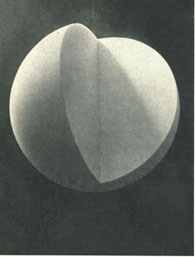 |
 |
Obaa-san and Ojii-san were growing old. Poor, but content, they lived by the edge of a stream in a modest cabin. Always they had desired children but, as the years passed, the hope of having any of their own began to fade. Though they never gave up hope, the despair began to wax as their childbearing years began to wan.
Each morning Obaa-san would arise before dawn to light the morning fire and prepare breakfast while Ojii-san still slept. It was at those times she quietly sang her prayers for fertility and for the gods to grant the gift of a child to bring new joy to them. Sometimes Ojii-san awoke to these soulful petitions but he would lay quiet, feigning sleep, until she had finished. He told himself he did not wish to burden her with the added disappointment that his resignation to their childlessness might bring. In truth, Ojii-san did not wish to interrupt her prayers. For, although his own hopes diminished by the day, he still held out for the unlikely miracle of adding a child to their household.
Each morning then, after breakfasting in silence, Ojii-san would put on his sandals, assure his wife that the gods had blessed them, and leave to do his daily chores and earn their meager livelihood as woodcutter and from doing odd jobs.
Obaa-san would do the household chores and take the wash down to the stream to launder. As the seasons passed and the days grew shorter and bleaker, her mood would grow melancholy and she would sometimes lighten her spirit by pretending the heavy winter kimonos were children's clothes that she was beating on the rocks. She would sing lullaby's to herself and imagine her own children playing nearby.
As the winter deepened, so too, Ojii-san's journey took him further and further into the mountains to gather scarce firewood. But always, at the sound of the temple bells from the village, he would load what wood he had found on his back and begin the trek home. Sometimes he would pretend the lengthening shadow that accompanied him was that of a growing son, and he would talk to it of the good work they had done that day and the wonderful times they would have ahead of them.
On this particular day, as Obaa-san began beating the clothes and singing her favorite lullaby, the stream seemed to sing back to her. As she continued singing and doing the wash, the icy water that swirled about grew strangely warmer and she began to dream. When she opened her eyes, the clouds had lifted and the warm sun glinted on the wet rocks. "Ah," she said to herself in amazement, "it is as if Springtime has come to pay a visit." Indeed, everything appeared brighter and more alive, the breezes mild and the water warm and restorative. She sang some more, a light lullaby of springtime. That is when it appeared from around a bend in the stream.
Bobbing and turning in the swift current, gleaming
in the sunlight, was a large golden peach! So large in fact that
she could scarce believe it not mere dream. Yet, as she continued
to sing her lullaby, the peach floated closer and closer to the
shore until it was no further from her than you are from this
page. Obaa-san reached out and grasped the golden peach. As she
held it in her arms, she continued to sing to it until tears of
joy were streaming down both of her cheeks. She cradled the peach
in her arms and walked back to the cabin. For the remainder of
the day, she would sing and rock the peach as though it were a
child.
When Ojii-san returned, he saw his wife on the porch
singing to this extraordinarily large peach. "Look!"
she said, "What the gods have brought to us this day."
and handed Ojii-san the golden fruit. Ojii-san was delighted.
"Let us taste this blessing to our house." and with
that, he set the peach on the nearby table and raised his ax above
his head in preparation to split open the golden peach.
Without thinking, Obaa-san reached out and seized
the arm that held the ax. "No! You Musn't!" At precisely
that moment, the peach rolled a little on the table and then split
of its own accord. From its center, a tiny baby boy emerged. Astounded
and dumbstruck, the couple took the boy in their arms and danced
with joy. The child they had so longed for had at last come to
them. In honor of his unorthodox arrival they named him "Momotaro"
- eldest son of a peach.
Thus begins the story of the hero-boy, Momotaro,
and the many adventures that befall him as he grows and becomes
the champion of his parents and the surrounding villages. At its
climax, the samurai Momotaro, finally slays the oni (ogres) on
the island of the Inland sea. But that is another story. It is
only these earliest beginnings that need concern us here.

 return to the poem 'momotaro' return to the poem 'momotaro' | |
 To Noguchi Lobby To Noguchi Lobby
|
©1999 Red Slider, all rights reserved. |